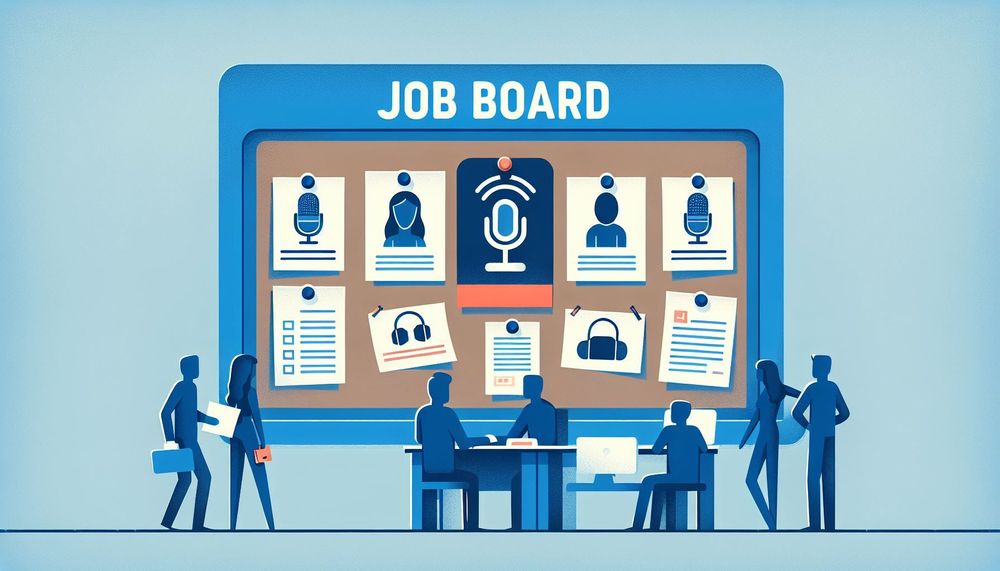Do you want to know how to work at a radio station?
Well, you have to learn about the different jobs at radio stations and know the specific radio station job descriptions. And here is a statistic to kick us off:
According to the Bureau of Labor Statistics, there were about 52,700 announcer jobs in 2016.
With that tidbit, let's get started:

Photo by Yohann LIBOT
1) Music Director
The music director, as the title gives, takes charge of the station's music. Key responsibilities include:
Sifting through music submitted by independent musicians.
Receiving and evaluating records submitted by promotional representatives from record labels.
Managing the station's music library like categorizing music into rotations as new, current, hits, etc.
Submitting music logs and overseeing the payment of royalties to performance rights organizations.
Coordinating with the program director on the shows.
2) Program Director
The program director is also the program controller (shortened to PC) or the head of programming. It's one of the key jobs at a radio station.
At the station, the PC reports to the head of radio or the station manager. And managing the overall programming (radio content) is the PC's main business.
The role further entails:
Managing the station's programming teams.
Ensuring that programming, what draws the listeners to the station, meets the expected standards of the station and furthers its business goals and overall mission.
Making sure that radio station content appeals to its audience.
Working closely with the programming departments in developing content such as the station's imaging.
If the station doesn't have a music director, the PC assumes the related tasks.
They take part in the recruitment and training of the programming team members.
3) Radio Presenter
The presenter is also called the on-air talent, show host, on-air personality, or DJ. Presenter jobs comprise the most advertised positions at radio stations.
The role entails keeping the audience entertained, informed, engaged, and glued to the station's programming.
It's vital to have a shining personality and come off as likeable and relatable.
On-air shifts typically last for about 2 to 4 hours. But the radio presenter won't just pack up and leave after the deed, they have more roles at the studio, including:
Developing content for the station's website & social media pages.
Attending the station's events or hosting remote broadcasts like road shows.
Researching, editing, and writing scripts.
Pre-interviewing scheduled guests to build rapport.
4) Announcer
Are you surprised that an announcer is not the same job description as the radio host?
Well, the announcer is the voice of the station. Presenters often voice single shows.
The announcer is valued for their voice, the presenter for their personality, and ability to entertain.
Now that we have made the distinction—and feeling like a couple of brainiacs—what set of responsibilities does the announcer take on?
Introducing music and shows.
Read the news copy and commercial copy.
Voicing the station's imaging like the call letters, station ID, weather announcements, trails, promos, etc.
Researching and formulating scripts.
At smaller stations, the presenter may also take on programming tasks, sell advertisement packages, schedule promos and ads, prepare content for the station's website and more.
5) Creative Writer & Copywriter
Liaising with the sales, marketing & content teams, the copywriter writes promotional copy for the station. They come up with unique scripts for commercials on behalf of clients.
Among jobs at radio stations, the role may not be widely advertised.
The copywriter may also prepare email campaigns, brochures, show summaries, website content, etc. They also proofread copy written by other employees at the studio.
6) Traffic Manager
What comes to mind when you read the words "traffic manager?" Do you picture a person directing the traffic with a huge handheld sign with the words "STOP"?
Well, a traffic manager's domain is the commercial studio. The job entails prepping the entire schedule for the broadcast day.
To do this, the manager will collaborate with the sales and programming department.
The goal is to establish a proper balance between the needs of the advertising clients and the programming team whose central role is to thrill their listeners.
It is also the job of the traffic manager to know how many ad slots are available and relay this information to the salespeople.
The traffic manager also ensures that content is available either from outside sources or in-house production teams; and that it meets the legal requirements imposed by the FCC (in the USA) and the quality standards of the station.
And the traffic manager will load the promos, ads and other items into the station's playout system.
With regular orders streaming from the sales department, traffic managers operate in fast-paced environments.
7) Broadcast Engineers
Who do you call when the microphone that has been working minutes before suddenly dies on you?
"The Broadcast Engineer."
Radio broadcast engineers handle all technical issues revolving around the broadcast equipment.
They install new systems and perform preventive maintenance on existing hardware to minimize failures.
And when the problems arise, the engineer must troubleshoot and solve them quickly.
It's one of the key jobs at big commercial radio stations with fewer career opportunities available at smaller stations.
Time is of the essence in such situations—because when the broadcast is down, the station listeners may tune in to competing stations.
8) Producer
When a movie is shot, the producer oversees the movie's production. For instance, ensuring the schedule is adhered to, the film is within the budget, etc.
In the studio, the producer oversees live and remote broadcasts.
Usually, the producer will coordinate with the host to create awesome shows. In this capacity, the producer might suggest the best questions to ask guests or signal when an ad-break is approaching.
In a talk show (tech-operated studio), the producer operates the broadcast desk in a separate room. Other tasks may include:
Protecting the radio station's license from invocation by ensuring that the programs don't feature obscenity, indecency or profanity.
Booking guests for live interviews.
Screening and pre-interviewing callers before they go on-air.
Running the board and working with the station's automation software.
Scheduling
Creating content for the radio's website and social pages.
9) Reporter
Finally, we have reporters or broadcast journalists.
This role involves gathering, investigating, and preparing news stories for on-air delivery or for publishing on the station's website.
News reporters may also prepare documentaries, radio series, rundowns, social media copy, weather announcements, etc.
Some news reporters are based in the office such as editors. Journalists are often out in the field following up with leads, attending events, carrying out interviews and more!
More radio station job titles
More radio positions include interns, assistant sales associates, assistant producers, etc.
Are you in charge of finding online streaming providers at your station? Here is a little something about us:
We provide radio hosting on premium servers with excellent uptimes and good peering. Your stream will be fast and buffer free.
If you need our services, get in touch with us by sending us an email or easily create an account.
Start your internet radio with us
We offer an excellent hosting option with a fully customizable price. Get started easily.
